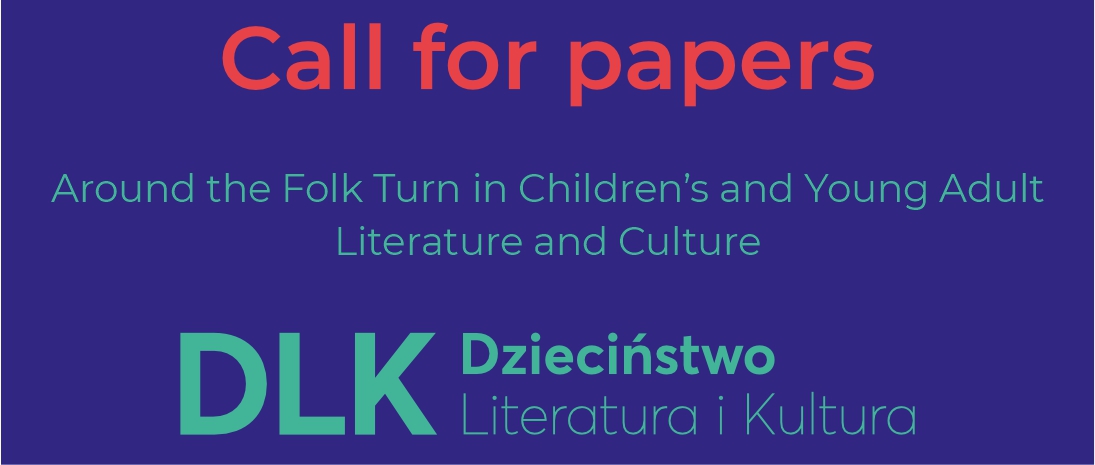CALL FOR PAPERS 1/2025

Around the Folk Turn in Children’s and Young Adult Literature and Culture
For at least a decade, terms such as ‘folk history’ and ‘folk turn’ have been regularly problematised in the Polish humanities discourse. Katarzyna Chmielewska (2021, p. 307) points out that "[f]olk stories are immersed in a contemporary cultural trend that evokes a lively social response.” Several cultural texts, where traditional culture is the central reference point, can be considered this specific “social response.” These include not only Ludowa historia Polski [Folk History of Poland] (2020) by Adam Leszczyński, Chłopki. Opowieść o naszych babkach [Female Peasants: The Story of Our Grandmothers] (2023) by Joanna Kuciel-Frydryszak, Nieprzezroczyste. Historie polskiej fotografii [Opaque: Stories of Polish Photography] (2023) by Agnieszka Pajączkowska, but also cross-media thematisations of the issue, such as the films Chłopi [Peasants] (2023, dir. DK Welchman and Hugh Welchman), Kos (2023, dir. Paweł Maślona) and the series 1670 (2023, dir. Maciej Buchwald and Konrad Kądziela).
Authors of children’s and young adult literature are also interested in Polish folklore and native traditional culture, examples of which are publications in the Beskid bez kitu [No Bunk Beskid] series (2020–2023) by Maria Strzelecka, Maryjki. Opowieści o Matce Boskiej [Our Lady of Nature: Stories about Mary] (2021) by Joanna Bednarek or Między światem a zaświatem [Between the World and the Beyond] (2022) by Katarzyna Jackowska-Enemuo. In the upcoming issue, we aim to take a closer look at how these works reconstruct folk history, the mechanisms of traditional culture, and the cognitive and interpretive models they create.
We invite you to try to explicate cultural texts that not only remind us in various ways of the “past world” but also exemplify perspective narratives (Chmielewska, 2021), trying to give a voice to those who have so far been deprived of it for various reasons. Joanna Tomicka and Ryszard Tomicki (1975, p. 9) wrote in the second half of the 20th century that “[t]he peasant is associated with poverty, primitivism, backwardness, and superstition. The only good thing that can be said about him is that he was oppressed, harassed, and discriminated against.” Have this attitude and the narrative framing it changed in formal and interpretive terms? How do contemporary cultural texts reconstruct the peasant voice and experience, and especially − so far ignored − the child’s voice and the experience of childhood? Furthermore, is such a reconstruction even possible? What is the status of children and teenagers in various textual constructions and reconstructions of traditional culture (Żołądź-Strzelczyk, 2006; Wróblewska, 2018)? What is the nature of contemporary cultural texts addressed to young recipients and focused on depicting the countryside, customs, and social relations? Are they postulative? Do they advocate equality and emancipation? Are they propagandist and mythologising In the light of these research questions, we also encourage critical and suspicious readings of texts that problematise native traditional culture.
It is also worth considering the general problem of the status of folk culture in the space of contemporary culture and verifying whether the words formulated by Tomickis (1975, p. 8) almost fifty years ago are still valid: “It is difficult to say [...] that in Polish society reliable knowledge about culture folklore is sufficiently widespread.”
We invite you to submit articles exploring, for example, the following problem areas − in the context of childhood and adolescence:
- folk narrative, “perspective narrative” (Chmielewska, 2021);
- folk history, a turn towards folklore;
- the postulative, equalitarian, and emancipatory nature of contemporary texts;
- propaganda image of the countryside in the texts of the Polish People's Republic, mythologised image of the countryside in contemporary texts;
- literary and cultural images of the countryside;
- folk genres – their renderings and transformations (fairy tale, aetiological folk tale, song, story, lullaby, etc.) (Ługowska, 1981);
- old and new implementations of traditional rites, rituals, and customs; folk customs;
- relations between children’s literature and popular literature;
- fair and festival circuits and children and youth recipients;
- folk demonology in literary and audiovisual texts (Wróblewska, 2014);
- the peasant child in the light of personal document literature;
- toys and games of a peasant child;
- the child towards "worlds" and "afterlife" (Zadrożyńska, 2000);
- education, reading, literacy;
- folk art, visual and artistic texts, iconotext;
- the peasant child towards fauna and flora;
- violence against peasant children, obligations and penalties, exclusion, orphanhood;
- the process of adolescence, initiation, rites of passage;
- the linguistic image of the world of a peasant child.
The guest academic editor of the issue is Dr. Kamila Kowalczyk.
We also invite you to submit texts unrelated to the issue’s theme to our Talks, Varia, and Review Articles sections.
Articles submission deadline: January 2, 2025
Submissions via the journal’s platform: https://www.journals.polon.uw.edu.pl/index.php/dlk
References
Chmielewska, K. (2021). Lud w perspektywie, perspektywa ludu. Teksty Drugie, 5, 293–309. https://doi.org/10.18318/td.2021.5.17.
Ługowska, J. (1981). Ludowa bajka magiczna jako tworzywo literatury. Zakład Narodowy im. Ossolińskich – Wydawnictwo.
Tomicka, J., Tomicki, R. (1975). Drzewo życia. Ludowa wizja świata i człowieka. Ludowa Spółdzielnia Wydawnicza.
Wróblewska, V. (2014). „Od potworów do znaków pustych”. Ludowe demony w polskiej literaturze dla dzieci. Wydawnictwo Naukowe UMK.
Wróblewska, V. (2018). Rola dziecka w tradycyjnej kulturze wsi polskiej. In: T. Smolińska (ed.), Folklor dziecięcy. Między tradycją a współczesnością (pp. 21–30). Małopolskie Centrum Kultury „Sokół”.
Zadrożyńska, A. (2000). Światy, zaświaty. O tradycji świętowań w Polsce. Wydawnictwo Książkowe Twój Styl.
Żołądź-Strzelczyk, D. (2006). Dziecko w dawnej Polsce. Wydawnictwo Poznańskie.





